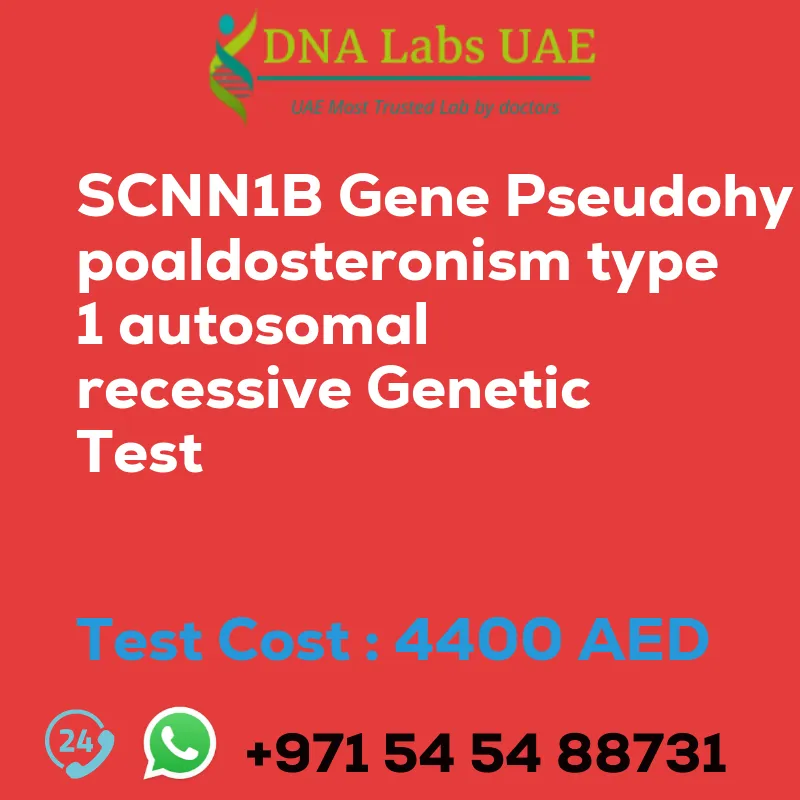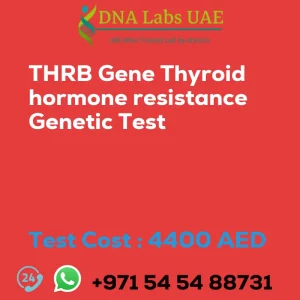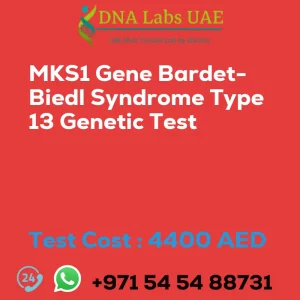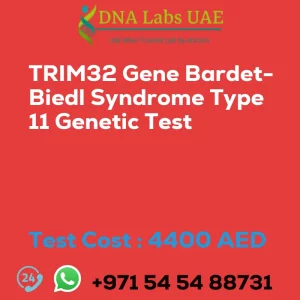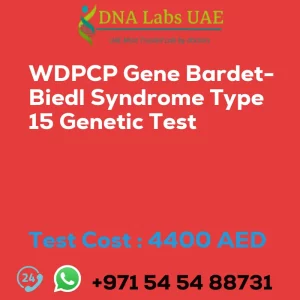SCNN1B Gene Pseudohypoaldosteronism type 1 autosomal recessive Genetic Test
Test Name: SCNN1B Gene Pseudohypoaldosteronism type 1 autosomal recessive Genetic Test
Components: SCNN1B gene pseudohypoaldosteronism, type 1, autosomal recessive is a genetic disorder that affects the function of the SCNN1B gene. This gene provides instructions for making a protein called the beta subunit of the epithelial sodium channel (ENaC). ENaC plays a crucial role in maintaining the balance of salt and water in the body. Individuals with pseudohypoaldosteronism, type 1 have mutations in both copies of the SCNN1B gene, resulting in a non-functional or reduced-functioning ENaC protein. This leads to impaired reabsorption of sodium in the kidneys, causing excessive salt loss in the urine. As a result, affected individuals experience dehydration, low blood pressure, and abnormally high levels of potassium in the blood.
Price: 4400.0 AED
Sample Condition: Blood or Extracted DNA or One drop Blood on FTA Card
Report Delivery: 3 to 4 Weeks
Method: NGS Technology
Test type: Hepatology Nephrology Endocrinology Disorders
Doctor: General Physician
Test Department: Genetics
Pre Test Information: Clinical History of Patient who is going for SCNN1B Gene Pseudohypoaldosteronism, type 1, autosomal recessive NGS Genetic DNA Test. A Genetic Counselling session to draw a pedigree chart of family members affected with SCNN1B Gene Pseudohypoaldosteronism, type 1, autosomal recessive NGS Genetic DNA Test gene SCNN1B
Test Details: NGS (Next-Generation Sequencing) genetic testing is a diagnostic tool used to identify mutations in the SCNN1B gene associated with pseudohypoaldosteronism, type 1. NGS allows for the simultaneous analysis of multiple genes, providing a comprehensive assessment of genetic variations that may contribute to the disorder. This test involves sequencing the DNA of an individual to detect specific mutations or variants in the SCNN1B gene that are known to be associated with pseudohypoaldosteronism, type 1. The results of the NGS genetic test can help confirm a diagnosis of pseudohypoaldosteronism, type 1 and provide valuable information for the management and treatment of affected individuals. It can also be used for carrier testing in individuals with a family history of the disorder or for prenatal testing in couples at risk of having a child with pseudohypoaldosteronism, type 1.
| Test Name | SCNN1B Gene Pseudohypoaldosteronism type 1 autosomal recessive Genetic Test |
|---|---|
| Components | |
| Price | 4400.0 AED |
| Sample Condition | Blood or Extracted DNA or One drop Blood on FTA Card |
| Report Delivery | 3 to 4 Weeks |
| Method | NGS Technology |
| Test type | Hepatology Nephrology Endocrinology Disorders |
| Doctor | General Physician |
| Test Department: | Genetics |
| Pre Test Information | Clinical History of Patient who is going for SCNN1B Gene Pseudohypoaldosteronism, type 1, autosomal recessive NGS Genetic DNA Test. A Genetic Counselling session to draw a pedigree chart of family members affected with SCNN1B Gene Pseudohypoaldosteronism, type 1, autosomal recessive NGS Genetic DNA Test gene SCNN1B |
| Test Details |
SCNN1B gene pseudohypoaldosteronism, type 1, autosomal recessive is a genetic disorder that affects the function of the SCNN1B gene. This gene provides instructions for making a protein called the beta subunit of the epithelial sodium channel (ENaC). ENaC plays a crucial role in maintaining the balance of salt and water in the body. Individuals with pseudohypoaldosteronism, type 1 have mutations in both copies of the SCNN1B gene, resulting in a non-functional or reduced-functioning ENaC protein. This leads to impaired reabsorption of sodium in the kidneys, causing excessive salt loss in the urine. As a result, affected individuals experience dehydration, low blood pressure, and abnormally high levels of potassium in the blood. NGS (Next-Generation Sequencing) genetic testing is a diagnostic tool used to identify mutations in the SCNN1B gene associated with pseudohypoaldosteronism, type 1. NGS allows for the simultaneous analysis of multiple genes, providing a comprehensive assessment of genetic variations that may contribute to the disorder. This test involves sequencing the DNA of an individual to detect specific mutations or variants in the SCNN1B gene that are known to be associated with pseudohypoaldosteronism, type 1. The results of the NGS genetic test can help confirm a diagnosis of pseudohypoaldosteronism, type 1 and provide valuable information for the management and treatment of affected individuals. It can also be used for carrier testing in individuals with a family history of the disorder or for prenatal testing in couples at risk of having a child with pseudohypoaldosteronism, type 1. |

